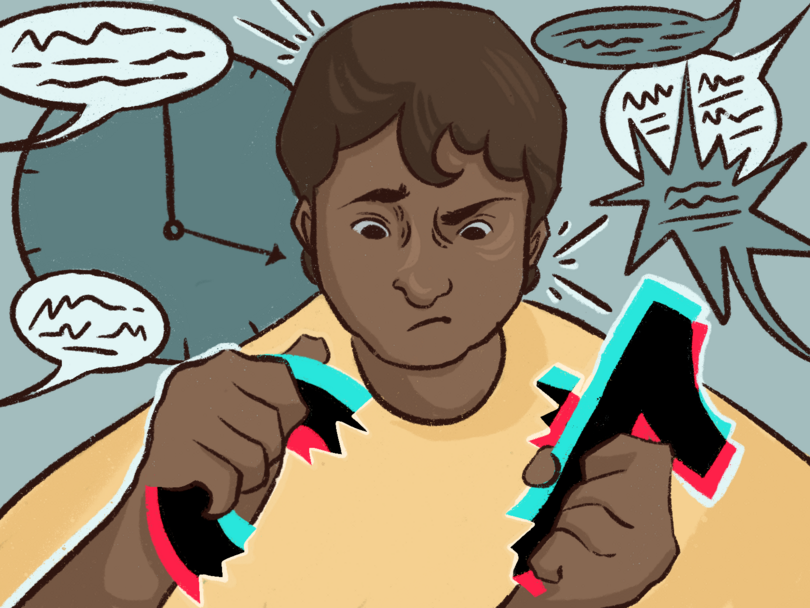Opinion: TikTok’s new algorithm, possible ban should encourage turn to other media

Since the pandemic, dependence on scrolling TikTok has overtaken younger generations who find unmatched community on the platform. Our columnist urges we put an end to doomscrolling before TikTok’s ban and prioritize offline interests Hannah Mesa | Illustration Editor
Get the latest Syracuse news delivered right to your inbox.
Subscribe to our newsletter here.
With the TikTok ban deadline of mid-September closing in and no confirmed American buyer, TikTok’s fate is up in the air.
This has forced me to reckon with my own dependence on the app. I’ve watched TikTok grow from Musical.ly – an app to share short lip syncing videos. It was a fun place to learn a song, but not an app that you could get sucked into for hours on end.
After exploding with popularity during the COVID-19 pandemic, TikTok now takes up an embarrassing amount of my time. The app currently offers a fast-paced video algorithm, catering to your interests and preferences.
While I used to think this made TikTok so appealing, I’ve come to realize it may be the app’s greatest weakness. It’s easy to find yourself in an echo chamber of likeminded creators in an algorithm that curates content to your likes and dislikes.
The app currently has plenty of things to love, like the ability to build community. I’ve connected with people on the app through my sustainable fashion and Syracuse University content, which makes campus feel more tight-knit. It’s exciting knowing I could run into my internet crush in Schine Student Center.
Josie Gilbert, a freshman studying communications and rhetorical studies, said she met her current roommate, who could tell they had a lot in common from her page, through the app.
And political content performs well on TikTok, too. I’ve watched plenty of first-hand protest documentation through the app, from Black Lives Matter to No Kings Day. The app also allows users to organize alternative forms of protest. During Donald Trump’s first reelection attempt, TikTok users reserved tickets to a Tulsa, Oklahoma, rally with no real plans to attend, causing an embarrassingly low turnout for Trump.
While I, too, enjoy engaging in a quick laugh or a thoughtful video that reinforces my own opinions, I fear the continuous scrolling actually does more harm than good.
TikTok’s fast algorithm has accelerated our trend cycle. This can lead to harmless fun when a new dance trend takes off, but more often becomes a larger problem of physical items and controversial ideologies coming in and out of relevance.
From fast fashion to Labubus, we’ve normalized and glamorized overconsumption. Those who find inspiration for their wardrobes by following quick trend cycles are more likely to buy an unethically produced, polyester garment, and they can do so easily through the TikTok shop. I’ll never understand the need to buy and waste excessively, especially in the clothing department.
Despite the environmental impact, it seems like TikTok is interested in speeding up their online shopping process even more. TikTok is updating its guidelines on Sept. 13 to reduce the visibility of videos featuring items available outside of the TikTok shop. This change to the algorithm will encourage users to purchase as quickly as they scroll.
It’s concerning to those who make content about these items outside of the TikTok shop, like me. My videos about sustainable shopping may no longer be pushed to larger audiences.
Some users are worried about political censorship on the app as well. TikTok has felt different since its brief ban, with an increase in misinformation warnings and limits on sharing certain political content. New guideline changes regarding misinformation may cause first hand accounts of “crises and major civic events” to be ineligible for the “For You” Page. If a protest isn’t being reported on by major news organizations, we may never hear of it.
This greatly exasperates the dependency we’ve formed on the app and its ability to create political change.

Zoey Grimes | Design Editor
Whether the app is banned again or the new guidelines mold the app into something else entirely, the golden era of TikTok has ended. The algorithm was beneficial when society was stuck inside, but our reliance on it is no longer needed.
By training our brains to chase a quick dopamine rush, we weaken our ability to focus on longer content with complex themes. Instead of trying to find TikTok in another app, we need to find something else to hold our attention.
We should prioritize finding community with those around us to fill the void, talking about political views over coffee with friends or finding activities that require a longer attention span, like reading a book.
TikTok is no longer what it was, and finding ways to remedy our craving for the original connection and inspiration it once provided is an easy next step to taking back the time otherwise spent doomscrolling.
Bella Tabak is a senior majoring in magazine journalism. She can be reached at batabak@syr.edu.






